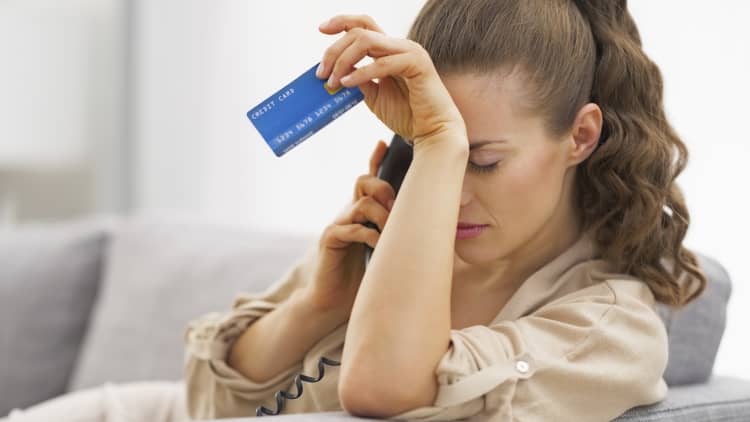
Credit card debt is at its highest level in six years. Among households with debt, the average credit card balance is nearly $16,000, according to Nerdwallet. You might not be dealing with that much debt. But figuring out how to pay it all off can still seem daunting.
These steps can help you get back in the black faster.
Figure out which debt to focus on first.
Logically, it makes sense to pay off the balance with the highest interest rate first. It will help you pay less overall in interest charges. But some argue there's a psychological benefit to paying the smallest balance off first to keep you motivated and on track.
Pay off the balance with the highest interest rate first if the interest you're paying on that balance is much higher than that on any other balances, and you don't think you can transfer the balance to a lower interest card and pay it off before it reverts to a higher interest rate (or the transfer fee required to transfer it is too high to make it worth doing).
Paying the smaller balance off first might make sense if you can transfer the highest interest balance through a low- or no-interest rate offer to another card, as long as you're sure that you'll be able to pay the balance off before the offer period ends. It can also make sense if the highest interest rate you're paying is not much higher than the interest on the small balance, and you're the type of person who needs a little encouragement to stay on track.
Read MoreHow much do you actually need to save for emergencies?
"We all have different forms of discipline," said Carolyn McClanahan, certified financial planner and founder of Life Planning Partners in Jacksonville, Florida, and some people "need occasional victories to see the cards go away." Although, she emphasized that, financially, "it makes better sense to pay the higher interest first."
Before deciding which balance to focus on first, you can also try calling your credit card issuers to see if you can get a lower fixed rate on the balance owed.
Create a plan and stick to it.
A big reason people end up with credit card debt is because they don't have a budget, said McClanahan. So a good way to start paying off your debt is to create a written plan, detailing which debt you'll tackle first and how much money you'll set aside each month to put toward your balances.
Calculate your budget with all of your monthly expenses and figure out all of the debt that you owe. Make sure to create a line in your budget for your card payments, and try to pay as much as you can afford. If you have it written down in your budget, you may not be as tempted to spend it elsewhere.
Make it a habit to pay in full.
"You should really have just one card on which the balance is paid in full each month," said Cindy Richey, president of Prosperity Planning in Kansas City, Missouri. Any cards with outstanding balances should not be used until they're paid in full. And if you do use them again, be sure you're able to pay it off in full that month.
Credit card companies want you to carry balances because it is profitable for them—they make money on the interest you pay. But it's in your best interest not to carry a balance. While you don't need to put your cards away for good, use them just enough to keep them active—card issuers will sometimes close accounts that aren't used for an extended period of time—and pay the balance off each month, so you're not paying interest. Having a history of timely payments, and a high ratio of credit available versus credit you're using, can help boost your credit score.
Read MoreSimple steps to improve your credit score
And if you have student loans, too?
Chances are, you do. On average, student borrowers who graduated this year owe $35,051, according Mark Kantrowitz, publisher at Edvisors. Student loan debt usually comes with a lower interest rate than credit card debt, though. So while you have credit card balances, focus on paying those off.
Read MoreHow to ease the burden of student loan debt
You can check, however, to see if you might qualify for student loan forgiveness programs, through which some of the student loan balance owed can be forgiven. You can also look into income-driven repayment plans, which allow you to pay a fixed percentage of your income, if you're concerned about your ability to handle your debt payments.
Even as you pay off your card balances, it's important to be setting aside money in an emergency fund, too. As you pay off your credit card balances, consider putting the money that went toward payments into savings, as well. That will help keep you from turning to credit cards when expenses do come up.


